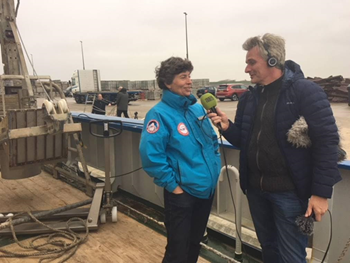UG researchers roll up their sleeves on NICO Expedition to the Atlantic Ocean
How can we get a grip on the opportunities and threats posed by ever-changing seas? To help answer this question, researchers from over 20 organizations are gathering knowledge in a national multidisciplinary expedition known as Netherlands Initiative Changing Oceans (or NICO). Around 100 researchers and several teams of students are spending 7 months on board RV Pelagia, the research ship of the Royal Netherlands Institute for Marine Research (NIOZ), studying the changing oceans in 5 ‘ocean provinces’. UG researchers Dr Jacqueline Stefels and Dr Maria van Leeuwe will be on board from 6 to 28 April (stage 8) to study the ecological consequences of climate change in the Atlantic Ocean. They will sail from the Bahamas to Galway.
From viruses to noise pollution, from coral reefs to whales, NICO is a unique expedition that provides a base for research in very different disciplines. The NICO programme integrates over 40 research questions from universities and research institutes: from seabed samples for climate research to viruses, from coral reefs to whales, and from shipping-related noise pollution to deep-sea mining. The expedition comprises a total of twelve stages, varying from a couple of days to several weeks. The ship set sail for Gran Canaria from its home port of Texel on 11 December 2017 and crossed to Curaçao and Saint Martin before heading for the Mississippi Delta. The expedition is now heading slowly in an easterly direction for further research in the Atlantic Ocean and close to the Azores.
Past ocean conditions
What are the ecological consequences of the changing conditions in the Atlantic Ocean? Several major ocean currents cross this ocean; each current has its own temperature, salt content and light intensity. These conditions determine the living environment for countless microscopic organisms ranging from single-cell algae to minuscule seashells and more substantial sea slugs. During the transatlantic crossing, UG researchers Jacqueline Stefels and Maria van Leeuwe studied the presence, diversity and functioning of these organisms in seawater and deep-sea sediment. Maria van Leeuwe: ‘There are two reasons for wanting to understand the relationship between ocean conditions and the life forms present. It enables us to work out the ocean conditions in various geological periods, and it also provides insight into the ecological effects of changing ocean conditions caused by climate change.’

Oceans Memorandum
One of the direct reasons for the expedition was what is referred to as the Oceans Memorandum, which was presented to the House of Representatives in spring 2017. The Memorandum contained thirty policy ambitions relating to the sustainable use of our oceans. ‘Generally speaking, memoranda like this end up in the bin, so we hope that our research will stop this one from sinking into oblivion. We support the policy ambitions and want to show that our research can make a real difference’, says Henk Brinkhuis, director of the NIOZ.
Those taking part in the NICO expedition include:
Utrecht University, the University of Amsterdam, VU University Amsterdam, the University of Twente, TU Delft, Wageningen University, the University of Groningen, Leiden University, Westerdijk Institute, TNO, Carmabi, MARIN, Naturalis Biodiversity Center, and a number of international organizations.
Follow the expedition on: nico-expeditie.nl
Social media: #ChangingOceans #NICOexpeditie #NICOexpedition
Facebook: @NICO-expedition
| Last modified: | 17 March 2025 09.46 a.m. |
More news
-
03 April 2025
IMChip and MimeCure in top 10 of the national Academic Startup Competition
Prof. Tamalika Banerjee’s startup IMChip and Prof. Erik Frijlink and Dr. Luke van der Koog’s startup MimeCure have made it into the top 10 of the national Academic Startup Competition.
-
01 April 2025
NSC’s electoral reform plan may have unwanted consequences
The new voting system, proposed by minister Uitermark, could jeopardize the fundamental principle of proportional representation, says Davide Grossi, Professor of Collective Decision Making and Computation at the University of Groningen
-
01 April 2025
'Diversity leads to better science'
In addition to her biological research on ageing, Hannah Dugdale also studies disparities relating to diversity in science. Thanks to the latter, she is one of the two 2024 laureates of the Athena Award, an NWO prize for successful and inspiring...
